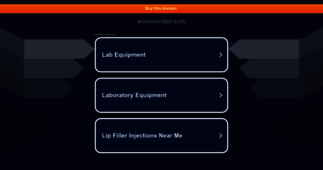The Wineoscope
Enter a key term, phrase, name or location to get a selection of only relevant news from all RSS channels.
Enter a domain's or RSS channel's URL to read their news in a convenient way and get a complete analytics on this RSS feed.
Unfortunately The Wineoscope has no news yet.
But you may check out related channels listed below.
[...] My February piece for Palate Press takes a look at what wine lovers can learn about (I’d say, a more balanced, maybe more [...]
[...] My March column on Palate Press, up today, takes a look at the practical side of biodynamics as its happening in Central Otago. [...]
[...] My September piece for Palate Press asks, “Is New Zealand the world’s most sustainable wine producing country?” to which the [...]
[...] My piece for Palate Press this month asks what California (proto-Davis) wine researchers were doing in the era before [...]
[...] family, notable because patriarch Terry Dunleavy was the first CEO of the Wine Institute of New Zealand (one of two parent organizations to the present-day New Zealand Winegrowers), and though they& [...]
[...] The Romeo Bragato conference is New Zealand’s national wine industry conference for producers, policy makers, vendors, researchers, and [...]
[...] If you don’t live in New Zealand, Seresin Estate is a producer you should know, or know better. They’re a largish (if you’re not [...]
[...] or two ago. A week or two ago I paid my first visit (of many, I expect) to Central Otago, New Zealand’s most southerly wine region, famous for pinot noir, Wild West-style scenery, and [...]
[...] Central Otago went from zero to international recognition in less time than it takes to test the merit of a [...]
[...] like before a week or two ago. A week or two ago I paid my first visit (of many, I expect) to Central Otago, New Zealand’s most southerly wine region, famous for pinot noir, Wild West-style [...]
[...] Palate Press, up today, takes a look at the practical side of biodynamics as its happening in Central Otago. I think that biodynamics can become — well, if not dangerous, then at least [...]
[...] metrics at all, like sniffing fine-aged manure with Rudi Bauer on his biodynamic estate in Central Otago; whatever you think of biodynamics, his extraordinary care for his land and vines and people [...]
[...] rules” are a bit different? The industries’ (because there’s not just one wine industry, right?) approach toward authentic wines made using technically illegal methods, in the [...]
[...] , but are now rare. This vineyard is a living testament to what the pre-prohibition California wine industry looked like. 3. Viticulture researchers look at grape genetics to understand why vines work [...]
[...] fact #1 – This technology isn’t new, though applying it to the sparkling wine industry is. Bioengineers came up with magnetic yeast in 2009. Interesting fact #2 – If [...]
[...] a PhD student gather some data (and improve the state of research communication in the wine industry), I’d be most grateful for your response to this survey on your feelings about [...]
[...] process of metabolizing sugar, so alcohol is a byproduct of survival; fair enough. But alcoholic fermentation is, in fact, a surprisingly inefficient way to get energy. The standard oxygen-requiring [...]
[...] with food. One of many, also including pickling by lactic fermentation, salting, drying, alcoholic fermentation, distilling, smoking, canning, and I’m probably missing something. Our food [...]
[...] Society for Microbiology and, like all microbiology, it occasionally touches on alcoholic fermentation. This week, Elio unearthed a hilarious spoof from the early days of fermentation [...]
[...] for alcoholic fermentation in these wines. Previous flor research also tells us that being flor is more about a [...]
[...] . (The short version: the only logical argument I can see is that sulfur dioxide aims to protect what the wine already has rather than add or change something; otherwise, we’ [...]
[...] is caused by unknown compounds that can’t be anthocyanins because they don’t respond to sulfur dioxide and pH in the expected ways. That book was published in 2006, though, and folks like James [...]
[...] , so I imagine this news doesn’t change much. Nonetheless, some folk might end up using more sulfur dioxide in an effort to knock down bacteria in ferments that tend toward stickiness. More [...]
[...] their results will generalize, but let’s hope this encourages someone to look. More: Sulfur dioxide is the single most commonly used winemaking chemical worldwide. That familiarity [...]
[...] straightforward enough. Cold soaks increased color density, but didn’t increase phenol or tannin concentrations. Cold soaking also didn’t make a statistical difference to any basic wine chemistry [...]
[...] , which is pretty accessible for a lot of winemakers). Though some wineries may measure tannin concentrations with that Harbertson-Adams assay, which is pretty accessible for a lot of winemakers, [...]
[...] My February piece for Palate Press takes a look at what wine lovers can learn about (I’d say, a more balanced, maybe more [...]
[...] My March column on Palate Press, up today, takes a look at the practical side of biodynamics as its happening in Central Otago. [...]
[...] My September piece for Palate Press asks, “Is New Zealand the world’s most sustainable wine producing country?” to which the [...]
[...] My piece for Palate Press this month asks what California (proto-Davis) wine researchers were doing in the era before [...]
Related channels
-
Gift Giving Ideas – GiftBook by GiftBasketsOverseas.com
Your #1 Source For Gift Giving. Have your international greetings challenge sorted out with GiftBasketsOverseas.com 2017...
-
Babyology
Modern finds for hip kids and parents
-
RadarOnline
undefined
-
NAG Online
South Africa's leading computer, gaming & technology magazine online
-
ArticleSnatch Article Directory - Fresh Articles
This feed is all the articles from the 20 most popular categories on ArticleSnatch.com. We have over 250 category specif...

